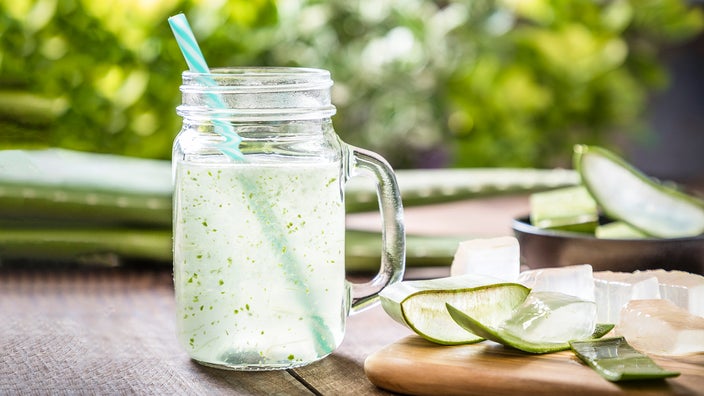
Is Drinking Aloe Vera Juice Good for You? Here Are 8 Health Benefits That You Should Know
Key takeaways:
Aloe vera juice is made from aloe vera gel mixed with water. Research shows that drinking aloe vera juice may have multiple health benefits.
When used as a laxative, aloe vera juice should be used in small amounts to avoid diarrhea and stomach pain.
There aren’t enough studies to support the use of aloe vera juice to treat high blood sugar in people with Type 2 diabetes.
Table of contents

Have you ever cut open a leaf from an aloe vera plant and rubbed the cool gel on a sunburn? It’s a traditional home remedy that’s been used for centuries to treat minor wounds and burns.
Aloe vera can also be used as a beverage. Reported benefits of aloe vera juice include soothing digestive issues like constipation and helping with blood sugar management.
But is aloe vera juice actually good for you? Let’s examine the evidence.
Save over 40% on Qsymia with GoodRx
Discover the once daily Qsymia for weight management. Qsymia is for adults and children 12-17 in combination with a healthy diet and regular exercise.

What is aloe vera juice?
Aloe vera juice is made from the thick, gel-like inside of aloe vera plants. Aloe vera gel is mixed with water and sold commercially as aloe vera juice.
Aloe vera juice uses
Aloe vera has many medicinal uses, especially since it can be applied directly to skin or taken orally (by mouth). It was traditionally used for skin conditions, as well as to heal wounds and help with hair loss. Aloe vera’s topical uses include:
Treating burns
Reducing redness and swelling
Relieving certain side effects of radiation and chemotherapy, like rashes and itchy skin
Aloe vera juice and other oral forms of the plant are also marketed to help with:
Diabetes management
Weight loss
Hepatitis
Inflammatory bowel disease
But not all of these uses have been backed by evidence, which we’ll cover in more detail below.
Aloe and sunburns: Find out how to use aloe to soothe a painful sunburn and when to seek medical care.
Looking for a natural way to treat acid reflux? These supplements may help treat your heartburn.
Gut health: Learn more about the signs of poor gut health and how to remedy them.
Potential benefits of drinking aloe vera juice
There are some potential benefits to drinking aloe vera juice, but more research is needed. Aloe vera juice isn’t an official treatment for the following conditions and may not even help with symptoms for some people. Always talk to a healthcare professional before adding aloe vera juice as a treatment option. They can help you figure out the best treatment plan for you.
Here’s what the science says about eight of aloe vera juice’s purported benefits.
1. Laxative effect
There’s an established laxative effect from aloe vera, mostly from the middle layer of the aloe leaves, known as the latex. This is the part of the plant that contains the anthraquinones (organic plant compounds) known as aloin, which are likely responsible for the laxative effect.
If you’re looking for a juice to help ease constipation and work as a mild laxative, choose one that’s made from aloe vera gel plus the latex (often called “whole leaf”). Read labels to know for sure, or ask your pharmacist.
Read more like this
Explore these related articles, suggested for readers like you.
2. Digestion aid
Lab studies have found aloe vera gel and juice contain anti-inflammatory fatty acids that may improve digestion. These substances may help regulate the smooth functioning of the colon, small intestines, and stomach.
That said, it’s unclear whether aloe vera is effective for people with certain digestive conditions, like irritable bowel syndrome (IBS). One small study found that people with IBS who took aloe vera juice saw more improvement in their symptoms than those who took a placebo. But other trials found conflicting results.
3. Heartburn aid
There’s not much research on aloe vera juice for heartburn. Much more research is needed.
One small study looked at the effects of aloe vera syrup on almost 100 people. Those who used aloe vera syrup once a day had heartburn symptom relief. This relief was like those who took prescription heartburn medications.
4. Lower blood sugar levels
Past studies found some evidence that aloe vera may help lower blood sugar and high cholesterol levels in people with Type 2 diabetes. But larger studies are needed to know for sure.
One recent study showed that aloe vera may improve blood sugar levels. But the evidence was limited. More research is needed before any concrete recommendations can be made.
5. Nutritious properties
Pure aloe vera juice has some nutritional and antioxidant properties. A cup of plain aloe vera juice has roughly 40 calories. The health value of aloe vera juice lies in its more than 200 active ingredients that come from the plant, including:
Anthraquinones (substances that help to stimulate the bowels)
Vitamins
Minerals
Enzymes
Amino acids
Natural sugars
Fatty acids
Some commercial brands of aloe vera juice contain sugar to add a twist on the slightly natural bitter taste. Make sure to check the labels to see how much sugar your beverage contains. Some contain as much sugar as soda.
6. Oral and dental health
One study looked at research on the use of aloe vera in dental practice. They found that aloe vera may help with the following oral conditions:
Oral lichen planus
Oral submucous fibrosis
Recurrent aphthous stomatitis
Radiation-induced oral mucositis
Periodontitis
Alveolar osteitis
Aloe vera may also help to limit the bacteria that cause cavities. Data in all of these conditions is limited. But aloe vera preparations didn’t seem to have any significant side effects. Not all of the studies use aloe vera juice. Gels and other topical preparations were also used.
7. Inflammatory Bowel Disease (IBD)
In one study, oral aloe vera showed improvement in ulcers and inflammation in people with ulcerative colitis. There were no negative side effects at the maximum recommended dosage of 100 mL twice a day. People who took aloe vera showed improvement in their overall symptoms, while those in the placebo group didn’t. But further studies are needed to figure out the effects at higher doses of aloe vera.
8. Antifungal
Aloe vera has a long history of being used to treat various fungal infections, from oral thrush to skin conditions like ringworm. But there’s very few studies in people to validate these claims. Some studies have been done in the lab that show that aloe vera can slow fungus growth as effectively as antifungal medications. The antifungal effects of aloe vera may be due to a protein in the aloe vera leaf.
How much aloe vera juice should you drink?
It’s hard to say exactly how much aloe vera juice you should drink. The food industry has established an upper limit of 10 parts per million (or ppm) of aloin in ingested aloe products such as juice. But bottles don’t have to say how much aloin is in them. This makes it hard to know how much you’re actually consuming.
Aloe vera has been approved by the FDA as a food additive, but food-grade aloe hasn’t been tested as a medical or therapeutic agent. As such, aloe vera juice remains unregulated. This means there’s no guarantee of strength, purity, or safety when you buy this product.
Each bottle may contain a different amount of aloe gel, latex, or aloin. There’s very little data on the levels of aloin in consumer aloe products, but most liquids have less than 1 ppm. This also makes it tricky to know how much to drink for a laxative effect.
What are the side effects of aloe vera juice?
Since aloe has a laxative effect, you shouldn’t drink too much at once. Drinking too much might cause:
Stomach pain or cramps
Diarrhea
Low potassium levels
Kidney failure
Hypersensitive skin reactions
Does aloe vera juice cause cancer?
It’s not likely that small amounts of aloe vera juice cause cancer. But some research says whole aloe vera leaf extract might possibly cause cancer. This means there’s a small amount of research linking it to cancer, but it’s far from conclusive.
Most of the studies have been conducted in mice and rats rather than in humans. And limited data showed that whole leaf aloe caused tumors in rats. We need more research on people to know if there’s really a risk.
Who should not drink aloe vera juice?
You shouldn’t drink aloe vera juice if you:
Are allergic to aloe or related plants
Are pregnant, as aloe may stimulate uterine contractions, which could increase the risk of premature labor or miscarriage
Are nursing, as the aloin may cause diarrhea in infants
Have a known liver or kidney condition
Aloe vera may also interfere with certain medications, such as some heart and diabetes medications. Talk to your healthcare professional or pharmacist before taking aloe to make sure it’s safe for you.
The bottom line
Research around all of aloe vera juice’s health benefits isn’t conclusive. Some people rely on low doses of aloe vera juice to treat constipation due to its laxative effect. But using too much can cause diarrhea and abdominal pain, so go slow. Talk to a healthcare professional before adding aloe vera to your treatment plan to make sure it’s safe for you to use.
Why trust our experts?



References
Djuv, A., et al. (2012). Aloe vera juice: IC₅₀ and dual mechanistic inhibition of CYP3A4 and CYP2D6. Phytotherapy Research.
FoodData Central. (2020). Aloe vera juice drink. U.S. Department of Agriculture.
Foster, M., et al. (2011). Chapter 3: Evaluation of the nutritional and metabolic effects of aloe vera. Herbal Medicine: Biomolecular and Clinical Aspects. 2nd edition.
Grosse, Y., et al. (2013). Carcinogenicity of some drugs and herbal products. The Lancet, Oncology.
Guo, X., et al. (2016). Aloe vera: A review of toxicity and adverse clinical effects. Journal of Environmental Science Health, Part C: Environmental Carcinogens and Ecotoxicology Reviews.
Hekmatpou, D., et al. (2019). The effect of aloe vera clinical trials on prevention and healing of skin wound: A systematic review. Iranian Journal of Medical Sciences.
Hong, S. W., et al. (2018). Aloe vera is effective and safe in short-term treatment of irritable bowel syndrome: A systematic review and meta-analysis. Journal of Neurogastroenterology and Motility.
Kumar, S. (2014). Ethnobotanical and pharmacological properties of aloe vera: A review. Journal of Medicinal Plants Research.
Langmead, L., et al. (2004). Randomized, double-blind, placebo-controlled trial of oral aloe vera gel for active ulcerative colitis. Alimentary Pharmacology & Therapeutics.
Mangaiyarkarasi, S. P., et al. (2015). Benefits of aloe vera in dentistry. Journal of Pharmacy & Bioallied Sciences.
Memorial Sloan Kettering Cancer Center. (2024). Aloe vera: Purported benefits, side effects and more.
Nabila, V. K., et al. (2020). The effect of aloe vera ethanol extract on the growth inhibition of Candida albicans. Medicinski Glasnik.
National Center for Complementary and Integrative Health. (2020). Aloe vera.
National Institute of Environmental Health Sciences. (2021). Aloe vera.
National Toxicology Program. (2013). National toxicology program technical report on the toxicology and carcinogenesis studies of a nondecolorized whole leaf extract of aloe barbadensis miller (aloe vera) in F344/N rats and B6C3F1 mice (drinking water studies). National Institutes of Health.
Panahi, Y., et al. (2015). Efficacy and safety of aloe vera syrup for the treatment of gastroesophageal reflux disease: A pilot randomized positive-controlled trial. Journal of Traditional Chinese Medicine.
Suksomboon, N., et al. (2016). Effect of aloe vera on glycaemic control in prediabetes and type 2 diabetes: A systematic review and meta-analysis. Journal of Clinical Pharmacy and Therapeutics.
U.S. Food and Drug Administration. (2023). Code of federal regulations title 21.





























